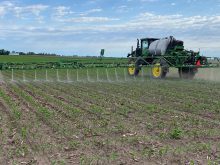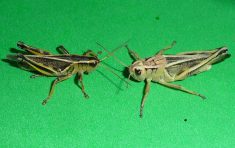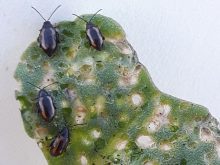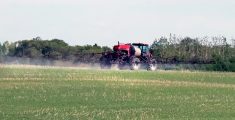In 2014, Manitoba introduced legislation to ban the cosmetic use of pesticides on lawns, parks and other public spaces.
Eight years later, Manitoba has partially reversed that ban.
On Nov. 4, the province announced it had passed legislation giving Manitobans more choice around the use of herbicides, insecticides and fungicides.
Read Also

Farmers asked to keep an eye out for space junk
Farmers and landowners east of Saskatoon are asked to watch for possible debris in their fields after the re-entry of a satellite in late September.
Individuals are now permitted to use pesticides on their lawns and municipalities can use them on places like boulevards, sidewalks, right of ways and fairgrounds.
But pesticides will not be permitted in “sensitive areas,” said Jeff Wharton, Environment, Climate and Parks Minister.
“By expanding the list of sensitive areas, our government continues to protect children and pets, while keeping communities safe and minimizing environmental impact. These protected areas include schools, hospitals, child-care centres, provincial parks, designated municipal picnic areas, playgrounds and dog parks,” he said in a statement.
Manitoba’s Progressive Conservative government had committed to altering the pesticide ban, introduced by the previous NDP government in 2014.
The Nov. 4 provincial statement, announcing changes to the pesticide ban, acknowledged that local and provincial governments don’t have the expertise to say which pesticides are safe and which are not.
“We recognize Health Canada as the foremost expert in this field to evaluate pesticides,” said Wharton. “Pesticides registered with Health Canada go through a rigorous review process that assesses the risk of pesticides to human health, animal health and the environment, and must meet strict health and safety measures. Manitoba will continue to rely on Health Canada to evaluate pesticide products and all pesticides sold and used in Manitoba.”
Despite that statement, the province will still prohibit the use of Health Canada approved pesticides at schools, playgrounds and other ‘sensitive’ locations.
In 2014, Manitoba’s NDP government said the cosmetic pesticide ban was needed to protect the health of children.
“Manitoba families want their children to be safe everywhere they play. This new legislation will ensure it does not matter where they are — at school, home or at daycare — they will be able to play on the grass that is free from potentially harmful chemical pesticides,” said Gord Mackintosh, Manitoba’s conservation minister in 2014.
Such statements were not popular with farm groups in Manitoba.
Multiple groups said it sent the wrong message to consumers. If pesticides are unsafe for lawns, how can they be safely applied to crops and farmland?
“MBP has concerns regarding the artificial distinction being made between so-called cosmetic use of pesticides and agricultural use,” the Manitoba Beef Producers said in letter to the province. “We do not believe that products can be considered safe in one environment and toxic in another. It is our view that this distinction between different uses of products sends an unfortunate (and ultimately dangerous) mixed message to the public at large.”
Municipalities were also unhappy with the ban. It increased the cost of controlling weeds and other pests. Organic weed killers must be applied multiple times to control weeds, making them more expensive than conventional herbicides.
“The Association of Manitoba Municipalities welcomes the Manitoba government’s decision to align with federal regulations and rigorous Health Canada review processes,” said Kam Blight, AMM president. “These legislative changes will allow municipalities to effectively manage weed-control programs while mitigating financial pressures on municipal budgets.”
Contact robert.arnason@producer.com


















